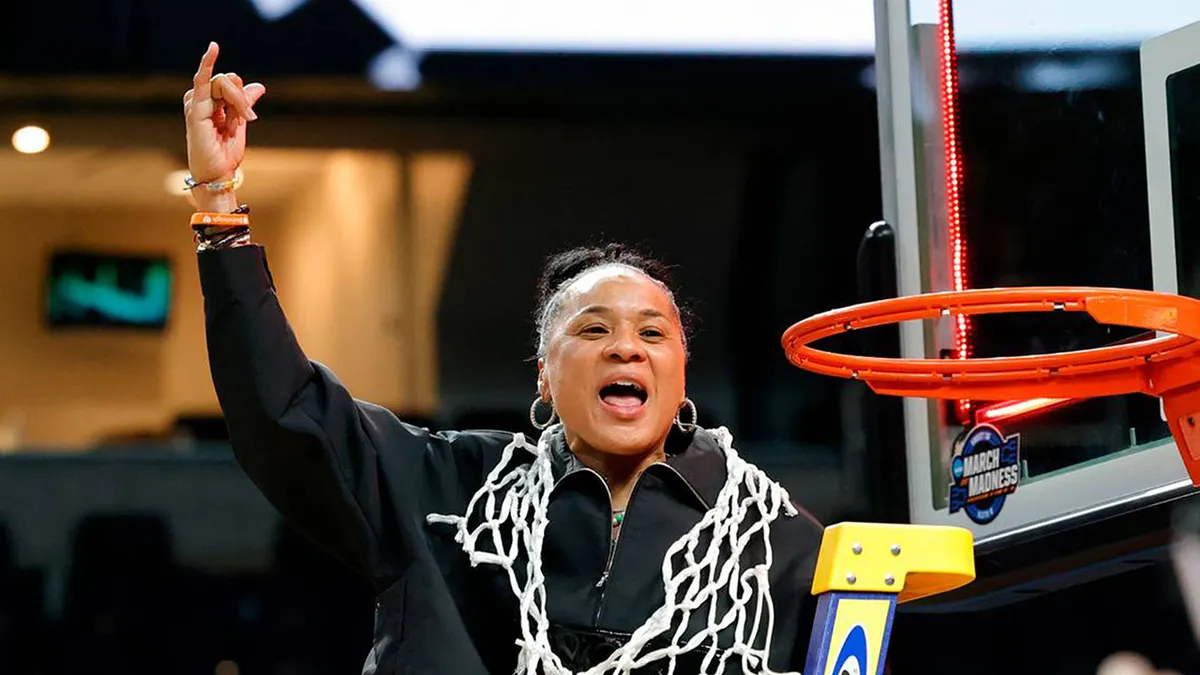Dawn Staley is a name synonymous with excellence, leadership, and transformation in women’s college basketball. As the head coach of the South Carolina Gamecocks, Staley has not only elevated the program to national prominence but has also become one of the most influential figures in the sport. Yet, behind her remarkable journey lies a lesser-known chapter — an opportunity she turned down that could have altered the course of her career and the trajectory of college basketball programs in the Southeast. Recently, Staley revealed that before accepting the prestigious South Carolina head coaching job, she had an offer from the University of Alabama — an offer she ultimately rejected.
This revelation came as a surprise to many fans and analysts who followed her career. Dawn Staley’s current status as a coaching legend and cultural icon in South Carolina is well documented, but few knew she had been courted by Alabama, a program seeking to raise its profile in women’s basketball. The decision to turn down Alabama’s offer, which on the surface might have seemed attractive given its resources and conference prestige, speaks volumes about Staley’s vision, values, and strategic approach to building a legacy.
Staley’s path to becoming one of the greatest coaches in women’s basketball is well marked by her achievements as a player and mentor. A three-time Olympic gold medalist, a Hall of Famer, and a fierce competitor, Staley’s deep roots in basketball run back to her playing days at the University of Virginia and in the WNBA. After her illustrious playing career, she transitioned into coaching, where she would eventually find her calling and transform programs. However, her first coaching job at Temple University was where she honed her craft, developing a reputation as a coach who could build programs with limited resources but boundless heart and discipline.
The University of South Carolina’s pursuit of Staley was part of a larger vision to establish itself as a powerhouse in women’s basketball. Before Staley’s arrival in 2008, the Gamecocks’ program had struggled to compete consistently in the highly competitive Southeastern Conference (SEC). South Carolina recognized that bringing in a coach of Staley’s caliber was essential to changing the program’s culture and success rate. Staley’s impact has been profound: under her leadership, the Gamecocks have won multiple SEC titles, reached numerous Final Fours, and secured the NCAA national championship in 2017, marking the program’s first-ever title.
What makes Staley’s revelation about Alabama so interesting is the contrast in how she viewed the opportunity versus what she envisioned for herself and her future. Alabama, known primarily as a football school, has had sporadic success in women’s basketball but has never reached the heights that South Carolina aspired to achieve. The offer from Alabama represented a chance to step into a program with significant resources but less defined basketball culture. However, Staley’s decision to decline reflected a deep understanding of what it takes to build a sustainable winning program — not just about facilities or money, but about community, support, alignment of values, and opportunity for long-term impact.
In interviews discussing her decision, Staley emphasized how critical it was for her to find a place where she could not only coach but also be a part of the community and develop players holistically. South Carolina, with its passionate fan base and university commitment to women’s sports, offered the right environment. The cultural fit was a major factor, something that Alabama, at that time, apparently could not match in Staley’s eyes. She wanted a program where her vision for empowerment, player development, and competitive excellence could flourish without compromise.
Rejecting Alabama’s offer was not an easy decision, especially given the prestige and potential visibility of coaching in a program tied to a powerhouse athletic department. However, it was a decision made with clarity and purpose. Staley understood the importance of timing and fit, and that sometimes turning down an opportunity is the key to opening the right door. Her faith in South Carolina’s vision and her own ability to change a program was vindicated as the Gamecocks rose to prominence, becoming a model for success in women’s college basketball.
The impact of Staley’s tenure at South Carolina has extended beyond just wins and losses. She has become a beacon for recruiting, bringing top talent to Columbia, South Carolina, and showing young athletes that they can thrive in a program with strong leadership and values. Moreover, her influence on the sport has been profound — advocating for women’s sports equality, fighting for better pay and conditions for female athletes, and mentoring countless players who have gone on to professional careers or coaching themselves.
Had Staley chosen to accept Alabama’s offer, it is intriguing to speculate how her career might have unfolded differently. Would she have been able to achieve the same level of success? Could Alabama have risen to challenge traditional SEC powerhouses like Tennessee and South Carolina? These questions highlight the importance of leadership choices in college sports — the difference one person can make when placed in the right environment.
Staley’s story also offers a lesson in career management and vision for all coaches and leaders. Sometimes, the “biggest” or most obvious opportunity is not the best one for long-term growth and fulfillment. The alignment of values, culture, and mission often outweighs prestige or short-term gains. Staley’s choice to reject Alabama in favor of South Carolina is a masterclass in leadership decision-making.
Since her arrival at South Carolina, Staley has not looked back. She has led the Gamecocks to consistent national relevance, becoming a symbol of excellence in coaching and athlete development. Her teams are known for their toughness, discipline, and ability to perform under pressure — qualities that reflect Staley’s own competitive spirit. Moreover, she has elevated South Carolina’s women’s basketball program into a national brand, attracting media attention, sponsorships, and fans.
In addition to her coaching accomplishments, Staley’s leadership extends to the international stage as the head coach of the U.S. Women’s National Basketball Team. Under her guidance, the team has continued to dominate globally, adding more Olympic gold medals and world championships to her already impressive résumé. This dual role only underscores her stature in the basketball world and her ability to inspire players at every level.
As women’s basketball continues to grow in popularity and competitiveness, coaches like Dawn Staley serve as trailblazers. Her story — including the choice to turn down Alabama’s offer — exemplifies the importance of vision, commitment, and strategic thinking in building lasting success. Staley’s impact on South Carolina is more than just winning games; it’s about transforming lives, communities, and the sport itself.
Looking ahead, there is no doubt that Dawn Staley’s legacy will continue to expand. With a foundation built on thoughtful decisions, relentless work ethic, and an unwavering belief in her mission, she has created a blueprint for coaching excellence. Her decision to reject Alabama’s offer was a pivotal moment — one that reaffirmed her dedication to building a championship culture where she could make the greatest difference.
In the world of college basketball, opportunities come and go, but it is the choices that leaders make that define their path. Dawn Staley’s choice to embrace South Carolina over Alabama demonstrates how courage, insight, and conviction can lead to extraordinary outcomes. It is a testament to the power of leadership grounded in values and vision, and it serves as an inspiration for coaches, athletes, and fans alike.
In sum, Dawn Staley’s journey from a decorated player to an iconic coach is marked not only by her successes on the court but also by the decisions she made off it. Her revelation about rejecting Alabama’s offer before landing at South Carolina adds a compelling chapter to her story — one that illustrates the importance of knowing where you belong and having the confidence to say no to what doesn’t fit. It is a powerful reminder that sometimes, the right door opens only when you turn away from the wrong one. For Dawn Staley and South Carolina, that choice has resulted in a legacy that will be remembered for generations.



